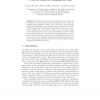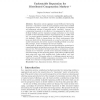25 search results - page 5 / 5 » ASPIER: An Automated Framework for Verifying Security Protoc... |
KBSE
2007
IEEE
14 years 1 months ago
2007
IEEE
We present tools to support model-based security engineering on both the model and the code level. In the approach supported by these tools, one firstly specifies the securitycr...
LPAR
2007
Springer
14 years 1 months ago
2007
Springer
Operational models of (security) protocols, on one hand, are readable and conveniently match their implementation (at a certain abstraction level). Epistemic models, on the other h...
FC
2006
Springer
13 years 11 months ago
2006
Springer
Reputation systems aggregate mutual feedback of interacting peers into a "reputation" metric for each participant. This is then available to prospective service "req...
ENTCS
2008
13 years 7 months ago
2008
ion in PRISM1 Mark Kattenbelt Marta Kwiatkowska Gethin Norman David Parker Oxford University Computing Laboratory, Oxford, UK Modelling and verification of systems such as communi...
LICS
2002
IEEE
14 years 10 days ago
2002
IEEE
Proof-Carrying Code (PCC) is a general framework for verifying the safety properties of machine-language programs. PCC proofs are usually written in a logic extended with language...


